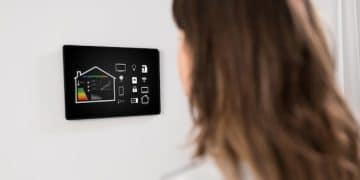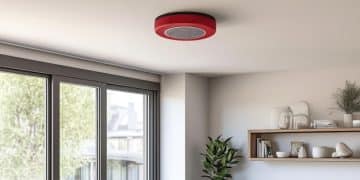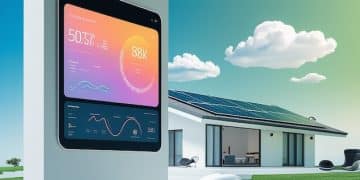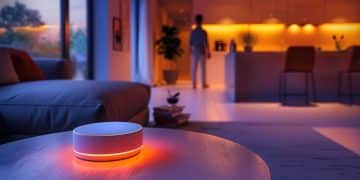Smart Home Investments: Best Technologies for ROI
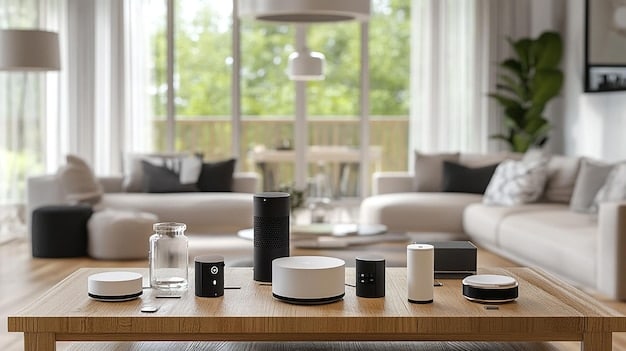
Anúncios
Investing in smart home technologies can significantly enhance property value and quality of life, with certain systems offering superior financial returns and long-term benefits in the U.S. market.
In an increasingly connected world, the allure of smart home technology extends far beyond mere convenience. For many homeowners, the question isn’t whether to embrace smart solutions, but rather, which ones offer the most tangible benefits and, critically, the best return on investment (ROI). Understanding the diverse landscape of devices, from intelligent thermostats to advanced security systems, is key to making informed decisions that enhance both lifestyle and property value. Let’s explore Smart Home Investments: Which Technologies Offer the Best Return on Investment?
understanding smart home ROI: beyond the buzzwords
The concept of return on investment in smart home technology is multifaceted. It’s not solely about increasing resale value, though that’s a significant component. ROI also encompasses energy savings, enhanced security, improved daily convenience, and even health benefits. A truly smart investment harmonizes these elements, providing a holistic uplift to your living experience and your property’s market appeal.
valuing convenience and efficiency
When evaluating smart home products, consider how they simplify routines or reduce costs over time. Many technologies are designed to automate mundane tasks or optimize resource consumption, leading to noticeable savings. For instance, programmable thermostats are a prime example of a device that offers immediate energy efficiencies.
- Energy savings: Devices like smart thermostats and lighting can drastically cut utility bills.
- Time saving: Automation frees up time spent on manual adjustments and repetitive tasks.
- Enhanced comfort: Automated climate control and lighting create a consistently comfortable environment.
long-term benefits and property appeal
Beyond immediate gains, certain smart home upgrades position a property more favorably in the competitive real estate market. Buyers are increasingly seeking homes equipped with modern conveniences and robust infrastructure. A well-integrated smart home system can be a definitive selling point, attracting a wider pool of potential buyers and potentially commanding a higher price.
Ultimately, the ROI of smart home technologies is a blend of financial gain, operational efficiency, and an elevated quality of life. Understanding this balance is crucial for making strategic investments that align with both your immediate needs and long-term goals.
smart thermostats and energy management systems
Among the pantheon of smart home devices, intelligent thermostats and comprehensive energy management systems stand out for their compelling ROI. Their primary function is to optimize climate control, which directly translates into significant and measurable energy savings. These aren’t just gadgets; they are sophisticated tools that learn your habits, respond to external conditions, and adjust accordingly to maintain comfort while minimizing waste.
Modern smart thermostats, such as those from Nest or Ecobee, go beyond simple programming. They incorporate geofencing to know when you’re home or away, integrate with local weather forecasts, and even detect open windows to prevent energy loss. This level of granular control ensures that your HVAC system operates at peak efficiency, preventing unnecessary heating or cooling.
the power of data and automation
The true genius of these systems lies in their ability to collect data and automate responses. By analyzing usage patterns and energy consumption, they can provide detailed reports, empowering homeowners to make even more informed decisions about their energy habits. This data-driven approach transforms energy management from a manual chore into a seamless, intelligent process.
- Adaptive learning: Thermostats learn preferences and automatically adjust schedules.
- Zone control: Some systems allow for temperature control in different areas of the home.
- Remote access: Adjust settings from anywhere via smartphone apps.
quantifiable savings over time
While the initial cost of a smart thermostat might seem higher than a traditional one, the return on investment through energy savings is often realized within a few years. Studies from reputable organizations like the American Council for an Energy-Efficient Economy (ACEEE) have consistently shown that smart thermostats can reduce heating and cooling costs by 10-15%. Over the lifespan of the device, these savings accumulate, often outweighing the initial expenditure by a significant margin. Furthermore, energy-efficient homes are increasingly appealing to potential buyers, adding to the resale value of the property.
Investing in smart thermostats and energy management systems is a pragmatic choice for homeowners seeking tangible financial benefits and a greener footprint. Their ability to deliver consistent savings while enhancing comfort makes them a top contender for the best ROI in the smart home arena.
advanced security systems: peace of mind and property value
When considering smart home investments, advanced security systems frequently emerge as a top contender for strong ROI. Beyond the obvious peace of mind they provide, these integrated solutions offer tangible benefits that can increase property value and even reduce insurance premiums. Modern smart security goes far beyond simple alarms; it encompasses a network of interconnected devices designed for comprehensive protection and remote monitoring.
These systems typically include smart cameras with motion detection and facial recognition, smart locks that can be controlled remotely, door and window sensors, and integrated alarm systems. Many also offer professional monitoring services, providing an additional layer of security and rapid response in emergencies. The ability to monitor your home from anywhere via a smartphone app is a powerful deterrent to potential intruders and offers unparalleled convenience.
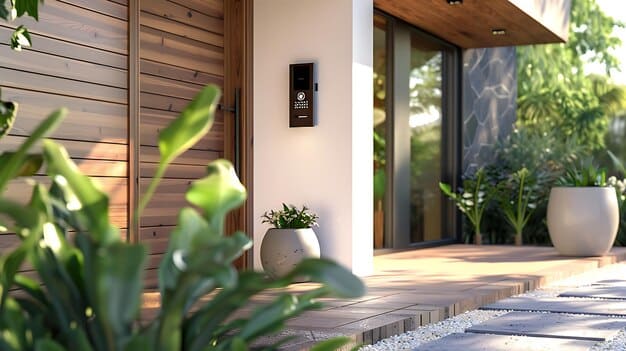
deterrence and reduced insurance costs
A visible smart security system acts as a significant deterrent to burglars. Homes with advanced security are statistically less likely to be targeted. Moreover, many insurance providers offer discounts on homeowner’s insurance premiums for properties equipped with modern security features. These reductions, though perhaps modest individually, contribute to the overall ROI of the investment over time.
- Crime deterrence: Visible cameras and sensors discourage potential break-ins.
- Remote monitoring: Check on your home from anywhere, anytime.
- Emergency response: Direct links to emergency services for rapid assistance.
enhanced resale value
For potential buyers, a pre-installed, state-of-the-art security system is a highly attractive feature. It signifies a well-maintained, forward-thinking home and saves them the time and expense of installing their own system. In a competitive housing market, smart security can be a distinguishing factor, potentially leading to a quicker sale and a higher asking price. The perceived safety and modern amenities appeal directly to buyers who prioritize security and convenience.
In essence, investing in advanced smart home security is a dual benefit: it protects your family and assets while simultaneously bolstering your property’s market appeal and yielding financial returns through insurance savings and increased sale value. It’s an investment in both safety and smart real estate.
smart lighting and automated window coverings
Smart lighting and automated window coverings, while sometimes perceived as luxury items, offer substantial benefits that contribute to both quality of life and considerable ROI. These technologies provide more than just convenience; they are powerful tools for energy management, security, and atmosphere creation, all of which add tangible value to a property.
Smart lighting systems, like those from Philips Hue or Lutron, allow for granular control over brightness, color, and scheduling. Lights can be dimmed, turned on/off remotely, or programmed to simulate occupancy when you’re away. Automated window coverings, whether blinds, shades, or drapes, can open and close according to a schedule, sunlight sensors, or even your daily routine, optimizing natural light and insulation.
energy efficiency and climate control
The most direct path to ROI for these systems is through energy efficiency. Smart lighting can eliminate wasted electricity from lights left on unnecessarily, and advanced LED smart bulbs consume significantly less energy than traditional ones. Automated window coverings play a crucial role in passive climate control. By closing during peak sun hours in summer, they can reduce heat gain, lessening the load on your air conditioning. In winter, opening them during sunny periods can passively warm your home, reducing heating needs.
- Reduced utility bills: Optimize lighting and temperature control.
- Enhanced security: Simulating occupancy deters potential intruders.
- Increased comfort: Automated adjustments for optimal light and privacy.
aesthetic appeal and health benefits
Beyond utility, these smart solutions significantly enhance the aesthetic appeal and living comfort of a home. Dynamic lighting can transform the ambiance of a room at the touch of a button, while automated window coverings offer a sleek, wire-free look. There are also health benefits, as circadian lighting systems can mimic natural light cycles, promoting better sleep and overall well-being. Properties equipped with such sophisticated features stand out, appealing to buyers who value modern design and intelligent living solutions.
Ultimately, smart lighting and automated window coverings offer a blend of energy savings, enhanced security, and elevated living standards, making them a wise investment that contributes positively to a home’s overall value and desirability.
smart kitchen and bath upgrades
The kitchen and bathroom are often considered the most important rooms in a home when it comes to resale value, and smart upgrades in these areas can significantly boost ROI. Investing in intelligent appliances and fixtures in these high-traffic zones offers a compelling mix of convenience, efficiency, and modern appeal that resonates strongly with potential buyers. These spaces are where practicality meets design, and smart technology enhances both.
In the kitchen, smart refrigerators can track inventory and suggest recipes, while smart ovens offer remote preheating and precise temperature control. Smart dishwashers can optimize water usage, and intelligent coffee makers can brew your morning cup on schedule. In the bathroom, smart mirrors provide integrated displays for news and weather, while smart showers offer programmable temperatures and personalized settings. Leak detection systems, especially in these water-heavy areas, also offer critical protection and preventative maintenance.
enhanced functionality and peace of mind
These upgrades go beyond mere novelty. They streamline daily routines, making cooking and personal care more efficient and enjoyable. The peace of mind offered by smart leak detectors, which can alert homeowners to potential plumbing issues before they become catastrophic, cannot be overstated. A single major water leak can cause thousands of dollars in damage, making these preventive measures a strong financial investment.
- Streamlined routines: Automated cooking, cleaning, and personal care.
- Water savings: Optimized usage from smart dishwashers and showers.
- Damage prevention: Early detection of leaks prevents costly repairs.
strong appeal to modern buyers
A smart kitchen or bathroom immediately elevates a home’s perceived value and modernity. Buyers are increasingly looking for homes that are ready for the future, equipped with technologies that simplify life and potentially reduce utility costs. These upgrades signal that a home has been thoughtfully maintained and updated, making it more competitive in the market. The convenience and cutting-edge features of these rooms often leave a lasting impression on prospective buyers, contributing to a quicker sale and a higher price point.
Investing in smart kitchen and bath technologies is a strategic move that combines daily utility with long-term property enhancement. These upgrades are not just about convenience; they are about creating a more efficient, safer, and highly desirable living space which significantly contributes to ROI.
whole-home integration and smart hubs
While individual smart devices offer specific benefits, the real power and ultimate ROI come from whole-home integration, orchestrated through a robust smart hub. A smart hub acts as the central brain of your connected home, allowing disparate devices from different manufacturers to communicate and work together seamlessly. This integration enhances functionality, improves efficiency, and elevates the overall value proposition of your smart home investment.
Without a central hub, smart devices often operate in silos, requiring multiple apps and separate controls. A hub, such as those supporting Zigbee, Z-Wave, or Matter protocols, creates a unified ecosystem. This allows for complex automations like “goodbye” scenes that turn off lights, arm the security system, and adjust the thermostat when you leave, or “welcome home” scenes that do the reverse.
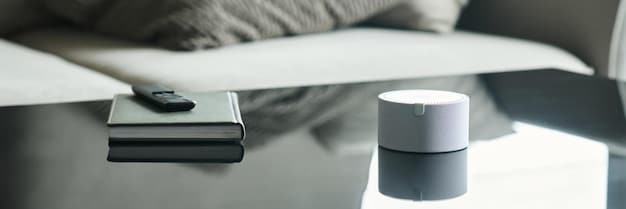
enhanced functionality and user experience
The ability to create intricate routines and control everything from a single interface (be it an app, voice assistant, or wall panel) significantly enhances the user experience. This level of automation and convenience is a major selling point. It transforms a collection of smart gadgets into a truly intelligent home that adapts to your lifestyle, making the living experience more comfortable and efficient. This added convenience simplifies daily life and truly showcases the potential of smart living.
- Seamless control: Manage all devices from one central interface.
- Complex automations: Create sophisticated routines for daily life.
- Future-proofing: Easier to add new devices and functionalities over time.
long-term value and future-proofing
For resale, a fully integrated smart home is far more attractive than one with fragmented smart devices. It signifies a thoughtfully designed and advanced property. Buyers appreciate the ease of use and the immediate benefits of a ready-to-go connected environment. Furthermore, a well-chosen smart hub often supports newer communication protocols, making your home more adaptable to future technological advancements and ensuring that your investment remains relevant for years to come. This future-proofing aspect is a crucial, often overlooked, component of ROI.
Investing in whole-home integration orchestrated by a smart hub consolidates the benefits of individual smart devices, creating a synergistic effect that maximizes efficiency, convenience, and ultimately, the financial return on your smart home investment.
professional installation and long-term maintenance
While the allure of DIY smart home setups is strong, especially with increasingly user-friendly products, professional installation and considerations for long-term maintenance are critical factors that significantly impact the actual ROI of your smart home investments. A poorly installed system can lead to frustration, inefficiencies, and even security vulnerabilities, undermining any potential financial gains.
Professional installers bring expertise in wiring, network configuration, and device compatibility. They ensure that all components communicate effectively, that security protocols are robust, and that systems are optimized for your specific home layout. This expertise minimizes troubleshooting time and prevents costly mistakes down the line, ensuring that your smart home operates from day one as intended.
optimizing performance and preventing issues
Beyond initial setup, regular maintenance and software updates are crucial for the continued performance and security of smart home systems. This might involve updating firmware, checking battery levels, ensuring network stability, and addressing any compatibility issues as new devices or software versions are released. Neglecting these aspects can lead to system glitches, decreased efficiency, and even exposing your home to cyber threats.
- Expert setup: Ensures optimal performance and device compatibility.
- Reduced troubleshooting: Avoids common DIY installation errors.
- Ongoing support: Access to technical assistance for issues and updates.
sustaining value and ensuring longevity
When it comes to resale, a professionally installed and well-maintained smart home system is a clear asset. It shows buyers that the technology is reliable and properly integrated, reducing their concerns about future problems. Moreover, having a service agreement or documented maintenance history can add an extra layer of reassurance. Companies specializing in smart home solutions often offer subscription-based maintenance plans that include vital updates and troubleshooting, providing peace of mind and preserving the longevity and functionality of your investments.
Considering professional installation and committing to long-term maintenance are not merely additional costs but strategic investments themselves. They safeguard your initial smart home expenditures, maximize their performance and longevity, and ultimately ensure a more substantial and sustainable return on your investment over time.
| Key Area | ROI Benefit |
|---|---|
| 💡 Smart Thermostats | Significant energy bill reductions (10-15%) and enhanced property appeal. |
| 🔒 Advanced Security | Increased safety, potential insurance discounts, and higher resale value. |
| 🏠 Whole-Home Integration | Maximizes convenience, future-proofs investment, and boosts overall attractiveness. |
| 🛠️ Professional Support | Ensures optimal performance, prevents costly errors, and extends system longevity. |
frequently asked questions about smart home ROI
Yes, many smart home investments can increase property value, especially those related to energy efficiency, security, and integrated systems. Modern buyers are often willing to pay more for homes equipped with these amenities, viewing them as valuable upgrades that enhance convenience and reduce long-term costs.
Smart thermostats and energy management systems typically offer the quickest ROI due to substantial savings on utility bills. Advanced security systems also provide a fast return through reduced insurance premiums and enhanced peace of mind, deterring potential property damage or theft.
Smart home gadgets can be a good investment for many, but the “best” investment depends on individual needs and priorities. Those looking to save on energy, enhance security, or improve daily convenience will find significant value. For others, the initial cost might outweigh perceived benefits, highlighting the importance of careful selection.
Professional installation significantly enhances ROI by ensuring optimal system performance, preventing costly errors, and maximizing functionality. It reduces troubleshooting time, guarantees proper integration, and can prevent future issues, thus making the initial investment more reliable and effective over its lifespan.
A smart home hub is a central device that allows various smart technologies to communicate and operate seamlessly. It’s crucial for maximizing ROI because it enables whole-home integration, facilitates complex automations, simplifies control, and ensures future compatibility, making your smart home truly intelligent and synchronized.
conclusion
As the smart home landscape continues to evolve, making informed investment decisions is paramount. While the promise of convenience is alluring, the true value lies in selecting technologies that deliver tangible returns—whether through energy savings, enhanced security, increased property value, or an elevated quality of life. By focusing on systems like smart thermostats, advanced security, and whole-home integration, homeowners can strategically invest in a future-ready living space that is both intelligent and financially savvy. Remember, the best smart home investment is one that aligns with your lifestyle goals while simultaneously contributing to the long-term value and efficiency of your most significant asset: your home.

